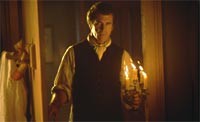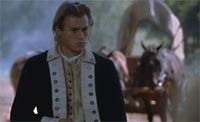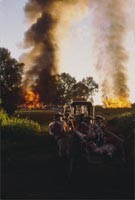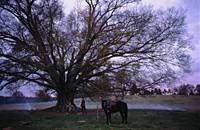
The Patriot
© Columbia Pictures Industries Inc., all rights reserved
Sony Pictures Entertainment Company
Presents a Mutual Film Company Production
of a Centropolis Entertainment Production
distributed by Columbia-TriStar Films

|
The Americans have reached the shores of Europe once again, but this time with the
American Revolution. "I have long feared that my sins would return to visit me and
the cost is more than I can bear," Benjamin Martin (Mel Gibson), reflects as he packs
away his trusty tomahawk, remnant of his experiences during the French and Indian
War. John Williams' full-blown notes announce that we are on a journey into the
world of Americana right from the opening titles. This personal tale of cruel tyranny
against hopeful righteousness manages to surge the spirit, incite hatred, and invite
tears as it wends its way through the formation of the world's second democracy. It
is an impressive movie.
Benjamin Martin enters one of the large homestead's bedrooms with the intention of
putting two of his kids to bed when he sees one girl pointing to the night sky and
explaining to her sister how to find the North Star. This, coupled with several other
"at home" conversations, establishes that everything is extremely family-orientated
under their piece of sky, where safety seems secure between four colonial walls.
(Mel Gibson captures this essence perfectly, but then he's quite a family man
himself.)
Trouble, however, is not so very far away. The Charleston Congress gathers in the
Assembly Hall to chew their options with regard to the approaching war, realizing that
the redcoat Army is rapidly nearing their territory. "South Carolina is not at war," one
argues, trying to avoid the responsibilities of fighting alongside other States who have
declared their opposition to England's rule. Others believe that their State should
accept equal responsibility if the nation is eventually to become truly united in their
cause. They've had "taxation without representation" up to their noses. When the
inevitability of confrontation is discussed, Benjamin is among those who declare
openly that he is not prepared to join in combat: "If you're asking me whether I'm
willing to go to war with England, the answer is no. I've been to war, and I have no
desire to do it again." Being a single parent with a crop of children to care for (seven
in all), he feels he has no other option and explains, "I'm a parent. I haven't got the
luxury of principles." Despite any opposition, the levy is passed 28 to 12 and, quicker
than you can load a musket, Gabriel (Heath Ledger) Martin, Benjamin's oldest son,
signs up to join the front. He feels strongly that the war is justified. In defying his
father's wishes, he ironically proves that the acorn has not fallen far from the tree.
Once the sadistic Colonel Tavington (Jason Isaacs), leader of the Green Dragoons,
discovers Martin tending wounded who have sought refuge on his front porch, he
torches the family's plantation home. Before doing this, however, he takes Gabriel
(who has recently returned) into custody, accuses him of spying, and condemns him
to be hanged. To finish things off in his inimitably cruel fashion, Tavington shoots the
younger brother, Thomas (Gregory Smith), and calls him a "stupid boy" as he dies in
his father's arms. The lines are now drawn. Benjamin will return to the battlefield,
but not before he ambushes the soldiers and releases Gabriel. Stationed in the
woods with his fellow family feuders, the shaken father asks them, "What did I tell
you, boys?" They uniformly answer, "Aim small. Miss small." Let the games begin.
But not before Benjamin, a religious man, offers a word of prayer: "Lord, make me
fast and accurate." After slaughtering his son's captors, the pain and anguish he
feels (having helplessly watched the murder of his younger son) expresses itself on a
bloodied face as he chops away with his trademark tomahawk into the last surviving
redcoat.
Wandering once again the pathways of war, Gabriel enters a ravaged house with
bodies strewn before it, where he quickly views two lines of soldiers through a
window (camera rides in, very Hitchcock) beginning battle on the field behind the
house. This is what it's like when war is in your own backyard. The 13-star bloodied
flag that lays, at one point, across a wounded soldier who defeatedly says, "It's a lost
cause" will be mended by Gabriel and return once again, much later in the film, to
proclaim the ultimate conquest.
With his Cherokee tomahawk, Benjamin Martin is now destined to become labeled as
the "Ghost" on reward posters. Considered a rebel on one side, he is known as a
patriot on the other. This fighter turned pacifist finds himself once again in the middle
of warfare despite being plagued by remorse and guilt about his murderous past. It is
only on the battlefield that Gabriel learns about his father's past at Fort Wilderness
(during the French and Indian War) since he had always been protected during his
formative years from the details of his father's wartime history.
Lord General Cornwallis (Tom Wilkinson), an English commander victorious over the
American forces at Charleston, is in charge of engagements and tactics. Wilkinson,
an actor capable of turning up in almost any role and doing it to perfection, portrays
him as an aristocratic officer with the intelligence and know-how necessary to win
battles time and time again. Cornwallis doesn't hold a very esteemed view of the
American soldiers and is even less respectful of their counterpart, the enlisted civilian
Militia. He quite simply believes that "These rustics are à inept." The reputable Lord
General is a man of taste who never relinquishes his standards of fair play until he
unacceptably loses face to the guerilla tactics of the American and French forces. At
that point, he is prepared to let a sick bastard like Tavington, whom he earlier
reprimanded, use his dastardly methods of maneuvering and manipulating in order to
achieve their desired ends.
Colonel Tavington is never beyond destroying homes and attacking helpless civilians,
women and children among them. He is an absolute sadist and a killing machine
with the goal of a better future hanging like a carrot before him. Totally unethical and
immoral, he is written as the ultimate villain and a nasty antagonist to boot. Jason
Isaacs says "I can't believe that I got paid to ride a horse around, fire muskets, chop
people up, be frighteningly evil, play scenes with Mel Gibson and hang out with an
extraordinary bunch of people. It's really been an incredible experience."
Mel Gibson, no stranger to heroic roles, turns in another polished performance as the
sensitive father and long-suffering combatant. From all reports he's also a joy to
work with on the set. Not only he, but also Emmerich and Devlin seem to have a
knack for keeping the atmosphere friendly and the event of filmmaking an enjoyable
one. You can't help but like Mel Gibson for all the right reasons.
The Patriot
© Columbia Pictures Industries Inc., all rights reserved
Sony Pictures Entertainment Company
Presents a Mutual Film Company Production
of a Centropolis Entertainment Production
distributed by Columbia-TriStar Films

|
The most exciting performance, however, is that of the 20-year-old Heath Ledger, not
only because he is a fairly new face on the silver screen, but because he manages to
portray Gabriel Martin as a young, innocent, idealistic, ethical defender of human
rights who, while having some of these personal qualities damaged, develops into a
mature man. As his education progresses through warfare, he undergoes many
intense, humane, and even shattering rites of passage. Finally, in having the
courage of his convictions and following through on them, he becomes the patriot.
The performance is sublime in its depth and reality.
Among the various townsfolk who find themselves inescapably tied up with the
events of the period are the Martins' freed slave Occam (Jay Arlen Jones), who fights
against the English, hoping to achieve his freedom once again, and the Reverend
Oliver (Rene Auberjonois), who also joins the Militia to fight beside Benjamin and
Gabriel (noting that "A reverend must tend his flock and, at times, fight off the
wolves"). The French troupes are strongly represented by their leader, Major Jean
Villeneuve (Tcheky Karyo), a man who experiences ample discrimination and finds,
at times, sufficient reason to both like and dislike the Americans. In one fell swoop
(and three characters), the barriers of race and religion have been dealt with. Of
course, there are also those who have taken the side of the English and are not
beyond betraying their fellow townspeople in accord with their political convictions.
One among them is Captain Wilkins (Adam Baldwin), whose notorious acts come
back upon him with a vengeful torment. (Keep in mind that Benedict Arnold's entire
reputation was altered when he wound up on the losing side.)
Memorable moments in the story, such as the burning of the church, the finding of
the North Star pendant, or the departure of Benjamin from his daughter Susan (Skye
McCole Bartusiak), are details that pierce the viewer to the core, but do not bear
discussion within the scope of a review. This journey through the South should be
experienced as it unravels. One devastating moment, which can bear mentioning, is
when Martin repeats the opening phrase, "Why do men feel they can justify death?
Is it arrogance? I have long feared that my sins would return to visit me and the cost
is more than I can bear." Though completely downtrodden and filled with loss and
grief, Benjamin Martin manages to return to the field carrying the American flag (13
stars) proudly before him. Very Braveheart.
Gibson: "I've seen the epics, and some of them don't touch you because they are
these big, sprawling things. They don't reach you on an emotional or human level at
all." Commenting on the character, he says, "He is terribly afraid because of his own
past and the karmic retribution that might result."
"It was a joy to work with Mel," Roland Emmerich says, "He was very committed to
concentrating on the acting, and is the most humble person there is."
The Patriot
© Columbia Pictures Industries Inc., all rights reserved
Sony Pictures Entertainment Company
Presents a Mutual Film Company Production
of a Centropolis Entertainment Production
distributed by Columbia-TriStar Films

|
The filmmaking team of director Roland Emmerich and producer Dean Devlin has
shifted from one kind of "Independence Day" to another. "There aren't really a lot of
films about that period or about the birth of this country," Devlin says, "and we
thought it was an amazing chance to show what life was like for a normal person at
that time, how ordinary people faced extraordinary circumstances. Beyond its
historical elements, though, the story touches you in an incredible way û it is a human
drama in an original visual setting." He adds finally, "It's an interesting time to look
back and think about how this country was started."
"There's an assumption that everybody's patriotic, and not everybody is. This movie
is called 'The Patriot,' but Benjamin Martin is not a patriot. He knows what war is and
feels that we should avoid it under all circumstances," director Roland Emmerich
notes.
Robert Rodat, Oscar® nominee for "Saving Private Ryan," who hails from Newport
News and spent his formative years growing up near Jamestown and Williamsburg,
wrote the screenplay. Those costumed characters running around the villages have
often left a lasting impression on the young. Watching the Visitor Center's film "The
Story of a Patriot" (starring Jack Lord) 50 times must have left an even longer lasting
effect on young Bob: "What we ultimately came to thematically is that you can't save
your own family unless you are willing to put yourself on the line to save the families
of all men." "The greater good and the personal welfare are linked, and they require
sacrifice." "I think these issues are important, and I hope they will have resonance for
the audience in all aspects of their lives." With direct reference to the script, he says,
"I thought it would be interesting to have the teacher in this case be the son. Gabriel
is a decent, moral guy, and he wears that mantle of principle and responsibility more
easily than his father does."
Mel Gibson believes that, "You don't have to go very far to realize that history quickly
repeats itself. Century by century, decade by decade, it's different players but the
same story playing itself out, with all its ugliness and glories, all its victories and
defeats." He adds, "This kind of story has been told since people have been dwelling
in caves and painting pictures; it's that combination of the ordinary and the divine that
inspires us and makes something really hit home for us, I think. Those are the kind
of stories I like." Very succinctly put, Mel.
An American epic of this scale made it necessary to both search for suitable existing
locations (e.g. with wide-open fields and colonial houses) as well as constructing
required buildings which either weren't able to be found or would be irreparably
damaged or destroyed during shooting. What better place to look for them than
South Carolina itself? Production designer Kirk M. Petrucelli, with the assistance of
art director Barry Chusid and set decorator Victor Zolfo, turned Emmerich's vision
into reality with such memorable sets as Freshwater (the Martin homestead). The
meticulous detail is visible everywhere, right down to the replica of Cornwallis' snuff
box (at his HQ in Fort Carolina).
The Williamsburg Foundation and the Museum of Early Southern Decorative Arts
assisted with information, but the Smithsonian Institution served as Historical
Consultant (and you can't do much better than that).
Devlin explains, "We tried to keep all the events of the movie true to events that
happened in the American Revolution û they may just not have happened in the
same way or in the same place. But the spirit of everything in the film can be drawn
from real events throughout the American Revolution."
Petrucelli has succeeded beautifully in making the different settings reflect the
characters' personalities housed within them. In general, the colonists are in
harmony with their environment while the English find themselves in more rigid and
formal surroundings. One has the chance to watch the decadent antics of an English
party at quayside that are "rudely" disturbed by the American bombardment of a
recently arrived English ship. (This scene was shot at Middleton Place, home of
"America's oldest landscaped gardens.") What may appear to many as a restful
seaside resort is actually the territory of the freed and escaped slaves (shot at Botany
Bay Plantation on Edisto Beach) where the Martin family escapes for a week among
thatched huts and fish-filled waters. These realistic and atmospheric locations are
fascinating and more captivating than many seen in previous epics dealing with
Americana.
An added plus must have been having tradesmen, artisans, craftsmen, and extras
that hailed from the actual surroundings and could proudly take part in the recreation
of their own history as well as managing to earn a pretty penny. Among this group
were the re-enactors, history buffs who make regular work of recreating simulated
wars around the country.
As for historical accuracy once again, re-enactor coordinator Riley Flynn comments,
"History is a judgement, and it evolves. The same is true of the re-enactments. What
we hoped to do on this project was to present the period and to be honest to it. We
may not always be specifically honest in all of the tactics. For instance, some of our
cannons were properly designed cannons from the period, but were probably too big
to have been used on the type of battle that we depicted. But we didn't use machine
guns." Stunt coordinator R.A. Rondell, on the other hand, felt he had to ensure that
all offensive moves in fighting were historically accurate as well as seeing that they
were executed safely.
The Patriot
© Columbia Pictures Industries Inc., all rights reserved
Sony Pictures Entertainment Company
Presents a Mutual Film Company Production
of a Centropolis Entertainment Production
distributed by Columbia-TriStar Films

|
Cinematographer Caleb Deschanel, whose magnificent panoramas are already
familiar from "Anna & the King," allowed the drama to dictate the style of the film
while simultaneously drawing upon ideas from both John Ford as well as Howard
Hawks. Frequently using multiple cameras, he would often shoot the same take at different speeds.
The mixture of lighting tones along with calculated imaging often
tells much of the story for each scene.
Special FX coordinator Yves de Bono organized exploding cannonballs (watch your
heads!), muskets and mortars on battlefields, in woods, and on waters, all with the
help of colored cards that Emmerich could cue for detonation. Although the large-
scale battles are quite impressive, they often lack the force and impact brought to
bear by the more personal, intimate confrontations that take place within the tale.
The only questionable device in the plot is the weeklong furlough taken after a crisis
occurs. It serves to give a peaceful moment in the middle of the war (for both the
family and the viewer) during which people can fish, joke, and even get intimately
involved with each other. This is very nice and exceptionally human, but one must
ask whether Martin would really suggest a furlough for the Militia with the redcoats
breathing down their necks. The hunt is on and that would make it seem a rather
dangerous undertaking.
With the elements in place for a good movie, one might well ask why the English are
so upset about this film. After all, many Americans have English backgrounds. It is
part of the heritage of America that its citizens hail from all over the world (lots of
homeless, tired, and wretched refuse). Obviously, the portrayal of Colonel Tavington
as a sadistic monster has many of our British brothers up in arms. War is not nice.
Sadists do exist (and are not indigenous to any specific nation). Sadists can be at
home in war. They can get away with murder. Is anything so new about these
concepts? Perhaps it is the fact that the antagonist is written so directly as being an
embodiment of pure evil that makes it disconcerting. But, the fact remains that these
kinds of people still exist today. Luckily, one British actor has comprehended this and
delivered a flawless performance in the role. And, when all is said and done,
shouldn't praising the ideals of righteousness, equality, and freedom be put more into
the spotlight than the country from which they originate? These moral issues are not
truly dealt with in the script (which depends for its appeal to a vast degree on the
prevalent and accepted norms found within the family unit), but one must remember
that this movie does not pretend to be a political analysis about the founding of a
nation, but rather offers a private drama reflecting a specific people's experiences
during the turbulence of wartime. It certainly doesn't seem to be pointing any fingers.
Nationalism diminishes in contrast to larger values every day as the world grows
smaller. Ever hear of the melting pot?
© 1994-2006 The Green Hartnett
|

